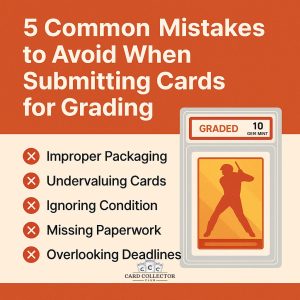In today’s market, graded cards consistently command higher value than raw cards. Whether you’re preparing for sports card investing or simply looking to preserve a personal collection, PSA’s slabs provide condition certification, authenticity, and market credibility. But mistakes in the submission process can cost time, money, and even the grade you were hoping for.
Mistake #1: Poor Packaging and Shipping

One of the most preventable mistakes is improper packaging. Even a tiny ding in transit can reduce a card from a PSA 10 to a PSA 8; dramatically lowering resale value.
Best practices for safe shipping:
- Use penny sleeves and semi-rigid holders (Card Saver I) for individual cards.
- Protect shipments with bubble wrap and sturdy boxes.
- Always include tracking and insurance, especially for high-value cards.
In our experience, collectors who over-prepare their packaging rarely regret the extra effort.
Mistake #2: Undervaluing Your Cards
Many collectors submit cards without fully researching their potential value. This can lead to poor insurance coverage or selecting the wrong grading tier.
Tips for accurate valuation:
- Check recent eBay sold listings for market comps.
- Review PSA population reports to see scarcity in top grades.
- Consult with a PSA Authorized Dealer who can help determine the best service level.
Remember, undervaluing a $1,000 card as $100 doesn’t just risk loss—it may also delay processing if PSA adjusts the declared value.
Mistake #3: Missing Submission Deadlines
Timing is everything in the grading process. Auction schedules, sports seasons, and market hype windows all play a role in ROI.
Why timing matters:
- Auction houses often set 6–8 week cutoff deadlines before events.
- PSA’s turnaround times can range from weeks to months, depending on service level.
- Missing a submission window may mean missing peak demand for a player’s card.
Plan backwards, start early to ensure your cards are graded and ready when the market is hottest.
Mistake #4: Submitting Every Card
Not every card is worth grading. Submission fees can quickly outweigh potential ROI if you send in bulk without strategy.
Cards usually worth grading:
- Vintage rookies in strong condition.
- Star players with high collector demand.
- Modern parallels, short prints, or autos with strong comps.
For a breakdown of grading tiers and process details, see our Baseball Card Grading Process guide.
Mistake #5: Overlooking Autograph Authentication
Cards with signatures require extra attention. Submitting them without autograph grading means leaving value on the table. Buyers place higher trust in PSA/DNA-certified autos, which can boost hammer prices significantly.
If you’ve invested in signed rookie cards or limited autographs, always consider dual grading (card + autograph) for the best ROI.
FAQ: Submission Questions
Q: Is it worth grading base cards?
A: Usually only if they’re vintage, rare parallels, or in gem-mint condition. Otherwise, fees outweigh value.
Q: Should I clean my cards before submission?
A: Light dust removal with a microfiber cloth is fine. Avoid aggressive cleaning that could damage surfaces.
Q: Can I submit directly to PSA, or should I use a dealer?
A: You can do both. Submitting through a PSA Authorized Dealer often provides safer handling, bulk pricing, and reduced risk.
Final Thoughts
Grading is one of the most important steps in protecting and maximizing your collection’s value. By avoiding packaging errors, undervaluing, missing deadlines, over-submitting, and ignoring autograph authentication, you’ll ensure your cards get the grades and returns they deserve.
Avoid rookie mistakes, let our team handle your PSA submissions securely.
